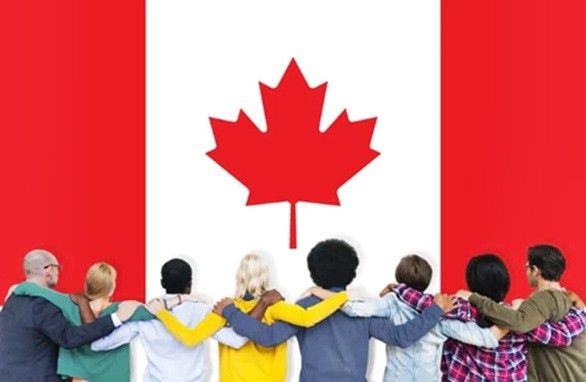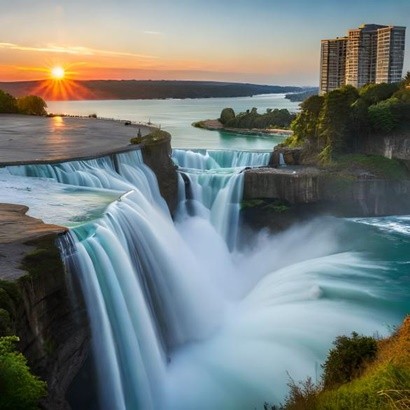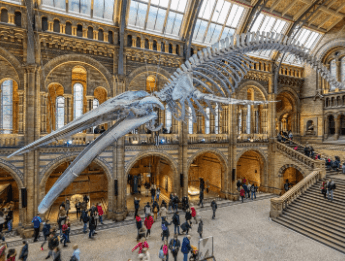25 Interesting facts about Canada
Dive into these 25 Interesting facts about Canada to uncover the nation’s distinctive history, culture, and natural wonders.
25 Interesting facts about Canada

1. Second-largest country in the world
Canada is the second-largest country by land area, spanning approximately 9.98 million square kilometers. Russia is the largest country, while the United States ranks third.
2. The Canadian flag’s history
Canada’s iconic flag, featuring a red maple leaf and red stripes, was officially adopted on February 15, 1965. This day is now celebrated annually as National Flag of Canada Day.
3. A multicultural nation
Canada is known for its multiculturalism, with more than 250 ethnic origins reported in the 2016 Census. Over 1 in 5 Canadians is foreign-born, making it a true melting pot of cultures.
4. Official bilingualism
Both English and French are official languages in Canada, with French predominantly spoken in Quebec. Approximately 17.9% of Canadians are bilingual, speaking both languages fluently.
5. The origin of the name “Canada”
The name “Canada” is derived from the Iroquois word “kanata,” meaning “village” or “settlement.” French explorer Jacques Cartier first used the word to describe the area around present-day Quebec City.
6. Canada’s extensive coastline
Boasting the world’s longest coastline, Canada’s shoreline stretches over 202,080 kilometers. If you were to walk around it without stopping, it would take roughly 4.5 years to complete the journey.
7. The Great Lakes
Canada shares the Great Lakes, the largest freshwater system on Earth, with the United States. These lakes hold roughly 21% of the world’s fresh surface water.
8. A nation of nature lovers
Canada has more lakes than any other country, with over 2 million lakes covering approximately 7.6% of its landmass. No wonder Canadians are known for their love of the great outdoors!
9. The world’s longest undefended border
The Canada-United States border is the world’s longest undefended international boundary, stretching 8,891 kilometers. It symbolizes the peaceful relationship between the two countries.
10. The origin of ice hockey
Ice hockey, Canada’s most popular sport, is believed to have originated from European stick-and-ball games. The modern version of the game was developed in Canada in the late 19th century.
11. Canadian inventions
Several notable inventions and innovations can be traced back to Canada, including insulin, the snowmobile, the electric wheelchair, and the Canadarm used on NASA’s Space Shuttle.
12. A global leader in education
Canada boasts one of the world’s top education systems, with a literacy rate of 99%. The country consistently ranks high in international education assessments.
13. Home to the world’s smallest jail
The world’s smallest jail, measuring only 24.3 square meters, can be found in Rodney, Ontario. It was in operation from 1890 to 1967.
14. World’s largest non-polar ice field
The St. Elias Mountains in the Yukon Territory are home to the world’s largest non-polar ice field. These ice fields feed many of Canada’s stunning glaciers.
15. Canada’s national animal
The beaver is Canada’s national animal, symbolizing the nation’s historical fur trade, which played a crucial role in its early development.
16. Unique natural phenomena
Canada is home to several unique natural phenomena such as the Northern Lights (Aurora Borealis), which can be seen from various locations across the country, particularly in the northern regions during winter months.
17. A haven for wildlife
Canada is home to a diverse range of wildlife, including polar bears, grizzly bears, moose, and caribou. The country also hosts the world’s largest population of wild reindeer.
18. Poutine: A Canadian culinary delight
Originating in Quebec, poutine is a popular Canadian dish consisting of french fries topped with cheese curds and smothered in gravy. Variations of this comfort food can be found across the nation.
19. Maple syrup production
Canada is the world’s largest producer of maple syrup, accounting for over 70% of global production. The province of Quebec alone produces 90% of the country’s maple syrup.
20. The world’s first national park service
Canada established the world’s first national park service in 1911 to protect and manage its vast natural heritage. Today, Parks Canada oversees 48 national parks, 171 national historic sites, and four marine conservation areas.
21. A prosperous economy
Canada is one of the world’s wealthiest nations, with a diverse and robust economy. Major industries include natural resources, manufacturing, and technology.
22. The Royal Canadian Mounted Police
The Royal Canadian Mounted Police, or RCMP, is Canada’s national police force. Established in 1920, the RCMP is known for its iconic red uniforms and its role in maintaining law and order across the country.
23. The world’s largest totem pole
Located in Alert Bay, British Columbia, the world’s largest totem pole stands at an impressive 52.7 meters (173 feet) tall. The totem pole showcases the rich Indigenous history and artistry of the region.
24. Canadian currency
Canada’s currency, the Canadian dollar, features portraits of notable Canadians, including Queen Elizabeth II and former prime ministers. The country’s coins are adorned with iconic Canadian symbols, such as the maple leaf and the beaver.
25. Canada’s role in space exploration
Canada has made significant contributions to space exploration, including the development of the Canadarm and Canadarm2 robotic arms. Canadian astronauts have also participated in numerous space missions, including Marc Garneau, the first Canadian in space, and Chris Hadfield, the first Canadian commander of the International Space Station.
By exploring these 25 Interesting facts about Canada, one can better appreciate the country’s unique culture, history, and natural beauty. Canada’s rich tapestry of stories and experiences make it a truly fascinating nation, full of surprises and discoveries waiting to be uncovered.
Frequently Asked Questions About Canada
Q: How many provinces and territories does Canada have?
A: Canada is divided into 10 provinces and 3 territories. The provinces are Alberta, British Columbia, Manitoba, New Brunswick, Newfoundland and Labrador, Nova Scotia, Ontario, Prince Edward Island, Quebec, and Saskatchewan. The territories are the Northwest Territories, Nunavut, and Yukon.
Q: What is the population of Canada?
A: As of 2021, the population of Canada is approximately 38 million people. However, this number is constantly changing due to births, deaths, and immigration.
Q: What is the capital city of Canada?
A: The capital city of Canada is Ottawa, which is located in the province of Ontario.
Q: What is the currency used in Canada?
A: The currency used in Canada is the Canadian Dollar (CAD), which is divided into 100 cents.
Q: What is the time zone in Canada?
A: Canada spans six time zones, including Pacific, Mountain, Central, Eastern, Atlantic, and Newfoundland Standard Time.
Q: Do I need a visa to visit Canada?
A: Visa requirements for visiting Canada depend on your nationality, the purpose of your visit, and the length of your stay. Some visitors may require an Electronic Travel Authorization (eTA) or a visitor visa. Check the Government of Canada website for more information.
Q: What is the climate like in Canada?
A: Canada has a diverse climate, ranging from Arctic conditions in the north to temperate and maritime climates in the south. Weather can vary significantly between regions and seasons, so it’s essential to check local forecasts before traveling.
Q: What languages are spoken in Canada?
A: English and French are the official languages of Canada. However, many other languages are spoken across the country due to its multicultural population, including Indigenous languages and various immigrant languages.
Q: Is healthcare free in Canada?
A: Canadian citizens and permanent residents have access to universal healthcare, which is funded through taxes. Visitors and temporary residents typically need to have private health insurance during their stay.
Q: What is the driving age in Canada?
A: The legal driving age varies between provinces and territories, usually ranging from 16 to 18 years old. Visitors with a valid driver’s license from their home country may be able to drive in Canada for a limited period.
Q: What is unique about Canada?
A: Canada is unique for its vast and diverse landscape, rich cultural heritage, bilingual nature (English and French), and being home to numerous indigenous cultures. It also boasts the longest coastline in the world, exceptional wildlife, and a strong commitment to environmental conservation.
Q: What is Canada famous for?
A: Canada is famous for its breathtaking natural beauty, including Niagara Falls, the Rocky Mountains, and the Northern Lights. It is also renowned for maple syrup, ice hockey, politeness, and a high quality of life.
Q: Are there any embarrassing facts about Canada?
A: Like any country, Canada has its quirks and oddities. For example, it’s illegal to remove a bandage in public in Canada, and it’s against the law to pay for something worth more than 25 cents using only one-cent coins. However, these peculiarities only add to the charm and character of the country.
Q: Can you tell me about the Canadian lifestyle?
A: The Canadian lifestyle is generally laid-back and focused on a healthy work-life balance. Canadians value outdoor activities, sports (especially ice hockey), and time spent with family and friends. The country is known for its friendly and polite people, as well as its strong sense of community and multiculturalism.
Q: What are some fun facts about Christmas in Canada?
A: Christmas in Canada is celebrated with a mix of traditions, owing to the country’s diverse cultural backgrounds. Some interesting Christmas facts include the “Mummering” tradition in Newfoundland, where people dress up in disguises and visit neighbors’ homes for food and drinks, and the “Réveillon,” a late-night feast held by French-Canadians after attending midnight Mass on Christmas Eve. Moreover, the world’s first recorded indoor ice hockey game took place on Christmas Day in 1875 in Montreal.





